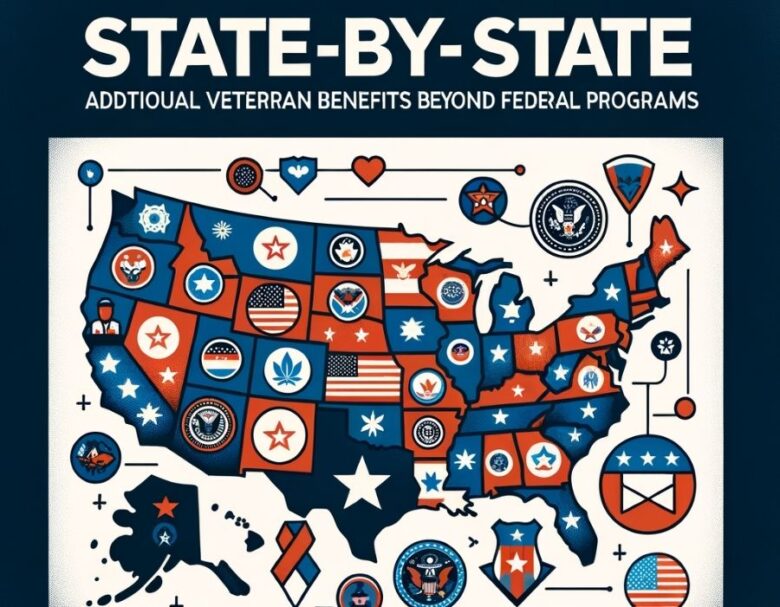While federal VA benefits form the cornerstone of support for veterans, many are unaware that individual states offer additional benefits to their resident veterans. These state-specific benefits can significantly enhance the support available to veterans and their families. This comprehensive guide will explore the landscape of state veteran benefits across the USA, highlighting some standout programs and providing resources for further information.
Understanding State Veteran Benefits
State benefits are separate from and in addition to federal VA benefits, often filling gaps or providing extra support.
Key Points About State Benefits:
- Vary widely from state to state
- May have different eligibility criteria than federal benefits
- Can include education, housing, tax, and employment benefits
- Often administered by state-level Departments of Veterans Affairs
- May require state residency or other state-specific criteria
Always check with your state’s Department of Veterans Affairs for the most up-to-date information.
Education Benefits by State
Many states offer education benefits that supplement the federal GI Bill.
Notable State Education Benefits:
- Illinois: Veterans Grant Program covers tuition and fees at state schools
- Wisconsin: Veterans Education Grant provides up to $2,000 per semester
- Texas: Hazlewood Act offers up to 150 hours of tuition exemption
- New York: Veterans Tuition Awards provide full SUNY/CUNY tuition coverage
These benefits often extend to dependents and sometimes have service-connected disability requirements.
Housing Benefits
Several states offer housing assistance programs for veterans.
State Housing Benefit Examples:
| State | Benefit |
|---|---|
| California | CalVet Home Loans |
| Alaska | Veterans Mortgage Program |
| Connecticut | Veterans Housing Assistance |
| Oregon | Home Loan Program |
These programs often offer low-interest loans or down payment assistance.
Tax Benefits for Veterans
Many states provide tax exemptions or credits for veterans.
Common State Tax Benefits:
- Property tax exemptions for disabled veterans
- Income tax exemptions on military retirement pay
- Vehicle tax exemptions
- Tax credits for hiring veterans
Tax benefits can result in significant savings for eligible veterans.
Employment Programs
States often have programs to help veterans find civilian employment.
State Employment Initiatives:
- Virginia: Virginia Values Veterans (V3) Program
- Michigan: Veteran-Friendly Employer Program
- Florida: Veterans Florida Career Services
- Washington: YesVets Hiring Initiative
These programs often include job training, resume assistance, and employer incentives.
Healthcare Supplements
Some states offer healthcare benefits to supplement federal VA healthcare.
State Healthcare Benefit Examples:
- California: College Fee Waiver for Veterans’ Dependents
- Massachusetts: SAVE Program for substance abuse treatment
- New Jersey: Veterans Health Care Initiative
- Connecticut: Long-Term Care Benefits
These benefits often focus on areas not fully covered by federal programs.
Hunting and Fishing License Benefits
Many states offer discounted or free hunting and fishing licenses to veterans.
Examples of Outdoor Recreation Benefits:
- Alaska: Free hunting and fishing licenses for disabled veterans
- Florida: Military Gold Sportsman’s License at a reduced fee
- Montana: Free conservation license for disabled veterans
- Maine: Complimentary licenses for veterans with 50%+ disability rating
These benefits allow veterans to enjoy outdoor activities at reduced costs.
State Veterans Homes
Most states operate veterans homes that provide long-term care.
Key Points About State Veterans Homes:
- Offer skilled nursing care, often at reduced rates
- May have different eligibility criteria than federal VA nursing homes
- Some states have multiple homes to serve different regions
- Quality and services can vary, so research is important
State veterans homes can be a valuable option for long-term care needs.
Benefits for National Guard and Reservists
Some states offer specific benefits for National Guard members and Reservists.
Examples of Guard/Reserve Benefits:
- Indiana: National Guard Supplemental Grant
- Ohio: Ohio National Guard Scholarship Program
- South Carolina: Free tuition for National Guard members
- Minnesota: State Tuition Reimbursement program
These benefits often focus on education and can be substantial.
Women Veteran Programs
Recognizing the unique needs of women veterans, some states have specific programs.
State Programs for Women Veterans:
- California: Women Veterans Affairs division
- Texas: Women Veterans Program
- New York: Women Veterans Coordinator
- Virginia: Virginia Women Veterans Program
These programs often provide tailored support and resources.
Entrepreneurship Support
Many states offer programs to support veteran entrepreneurs.
Veteran Business Support Examples:
- Georgia: Veteran-Owned Small Business Connect Program
- New York: Service-Disabled Veteran-Owned Business Program
- California: Disabled Veteran Business Enterprise Program
- Illinois: Veteran Business Program
These programs often include contracting preferences and business development support.
How to Access State Benefits
Accessing state benefits requires some proactive steps on the part of veterans.
Steps to Access State Benefits:
- Contact your state’s Department of Veterans Affairs
- Gather necessary documentation (DD-214, proof of residency, etc.)
- Review eligibility criteria carefully
- Apply for benefits you qualify for
- Keep records of all applications and communications
Don’t assume you’re automatically enrolled in state benefits – you often need to apply.
Frequently Asked Questions
Q: Do I need to choose between federal and state benefits? A: Generally, no. State benefits are typically designed to supplement, not replace, federal benefits.
Q: Can I access benefits from multiple states? A: Usually, you can only access benefits from your state of residence, but there may be exceptions for education benefits.
Q: Do all states offer the same benefits? A: No, benefits vary widely from state to state. Some states are more generous than others.
Q: How often do state benefits change? A: State benefits can change annually based on budget allocations and new legislation. Always check for the most current information.
Q: Can my dependents access state veteran benefits? A: In many cases, yes. Many states extend certain benefits to spouses and dependent children of veterans.
Conclusion
The landscape of state-level veteran benefits is diverse and ever-changing, offering a wealth of opportunities for veterans to access additional support beyond federal programs. From education assistance and housing loans to tax exemptions and employment programs, these state benefits can significantly enhance the quality of life for veterans and their families.
It’s crucial for veterans to be proactive in exploring and accessing these benefits. What’s available in one state may not be offered in another, and eligibility criteria can vary widely. This diversity means that veterans should consider state benefits when deciding where to live after service, as the differences between states can be substantial.
Remember, these state benefits are not automatic. In most cases, you’ll need to apply and provide proof of eligibility. Stay informed about changes in your state’s veteran benefit programs, as new benefits may be added, and existing ones may be modified.
Don’t hesitate to reach out to your state’s Department of Veterans Affairs or local veteran service organizations for assistance in navigating these benefits. These resources can provide valuable guidance and support in accessing the full range of benefits available to you.
As you explore these state-level benefits, keep in mind that they are a reflection of your state’s commitment to honoring your service. By taking advantage of these programs, you’re not only accessing earned benefits but also reinforcing the importance of continued support for the veteran community.
Lastly, consider sharing your knowledge about state benefits with fellow veterans. Many are unaware of these additional resources, and your insights could significantly impact another veteran’s life. By staying informed and engaged, you continue to serve by ensuring that you and your fellow veterans make the most of the support available at both the federal and state levels.
Your service to our nation doesn’t end with your time in uniform, and neither does the nation’s commitment to supporting you. State veteran benefits are an important part of that ongoing commitment, offering additional layers of support as you continue your journey in civilian life.




